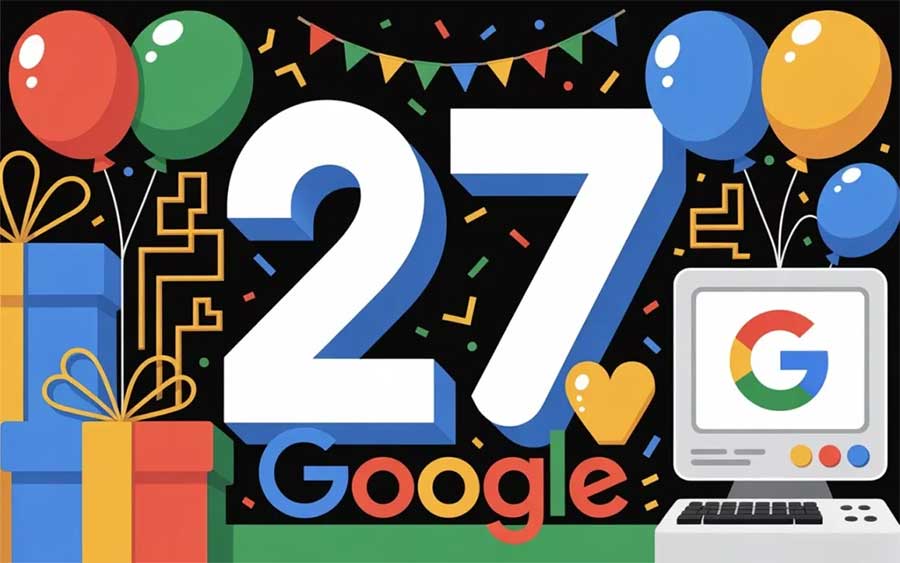
Google celebrated its 27th birthday with a doodle inspired by its original 1998 logo. More than a nostalgic gesture, the milestone offers an opportunity to reflect on its humble origins, meteoric growth, cultural significance, and the new existential challenges posed by Generative AI (GenAI).
Google began as a research project at Stanford University, where founders Larry Page and Sergey Brin sought to improve web search. Initially called BackRub for its focus on backlinks, the project needed a name that reflected its vision of indexing immense amounts of data.
They turned to the mathematical term Googol (1 followed by 100 zeros). During a brainstorming session, however, a typo turned “Googol” into Google. The mistake stuck—memorable, simple, and fitting. The domain was registered on September 15, 1997, marking a pivotal step in Google’s story.

The name itself captures Google’s mission: to organize the world’s information and make it universally accessible and useful.
Google was incorporated on September 4, 1998, operating from a garage rented from Susan Wojcicki (later YouTube’s CEO). Its breakthrough was the PageRank algorithm, which delivered more relevant search results than rivals.
A $100,000 check from Sun Microsystems co-founder Andy Bechtolsheim helped fuel growth. By 2004, Google went public, raising $1.67 billion and cementing its leadership in search. Over the next decade, it expanded into Gmail, Maps, Translate, Android, and Chrome, and acquired YouTube in 2006.
In 2015, Google restructured under Alphabet Inc., allowing it to focus on core internet services while supporting “moonshots” like Waymo (autonomous cars) and Verily (life sciences). Sundar Pichai, who became CEO of Google in 2015 and Alphabet in 2019, has since overseen diversification and growth.
Today, Google’s ecosystem includes:
· Search: Billions of daily queries powered by AI.
· Android: The world’s dominant mobile OS.
· YouTube: 2+ billion monthly users.
· Google Cloud: Competing with AWS and Microsoft Azure.
· AI/ML: Platforms like TensorFlow and BERT reshaping natural language processing.
Culturally, Google has become synonymous with knowledge—the word “Google” itself is now a verb. Its Google Doodles are cultural touchpoints, highlighting events and milestones globally.
Yet, success has raised concerns about privacy, surveillance capitalism, and monopoly power. Regulatory challenges, including EU antitrust fines and U.S. lawsuits, underline tensions between innovation and responsibility.
Google’s dominance faces a new test: GenAI tools such as ChatGPT, Perplexity, Copilot, and even its own Gemini. Unlike traditional search, these platforms act as answer engines, synthesizing real-time information instead of serving link lists.
By late 2024, GenAI engines were matching or surpassing Google in intent understanding. Perplexity aggregates cited research, ChatGPT excels in conversational depth, and Copilot integrates across Microsoft platforms. This shift threatens Google’s ad-driven revenue model, as users bypass links and ads for direct answers—potentially costing billions.
As Google enters its 28th year, three challenges dominate:
1. Competition – Rivals and GenAI disruptors are eroding search dominance.
2. Regulation – Governments are tightening oversight on data, privacy, and market power.
3. Innovation – AI, quantum computing, and AR require massive investment.
Alphabet’s structure gives Google room to adapt, but survival will depend on its ability to integrate AI-driven searchwithout undermining its own business model.
Google’s 27-year journey—from a garage startup to a global synonym for knowledge—reflects serendipity, adaptability, and ambition. But in the GenAI era, the company must reinvent search itself. Whether it can turn disruption into opportunity will define its future—and the next chapter of the internet.
See What’s Next in Tech With the Fast Forward Newsletter
Tweets From @varindiamag
Nothing to see here - yet
When they Tweet, their Tweets will show up here.





























